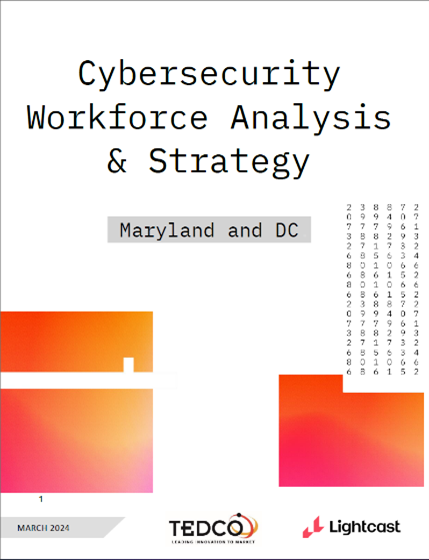Findings include a misalignment of cybersecurity workforce supply and demand
COLUMBIA, Md., (May 29, 2024) —  TEDCO, Maryland’s economic engine for technology companies, unveiled the recently completed “Cybersecurity Workforce Analysis and Strategy” (“Study”). The Study was commissioned by TEDCO to better understand the current status of Maryland’s cybersecurity workforce pipeline. This knowledge will be used to guide the Cyber Maryland Program (“Program”) and its 18-member board of directors as they develop a statewide cybersecurity workforce development strategic plan.
TEDCO, Maryland’s economic engine for technology companies, unveiled the recently completed “Cybersecurity Workforce Analysis and Strategy” (“Study”). The Study was commissioned by TEDCO to better understand the current status of Maryland’s cybersecurity workforce pipeline. This knowledge will be used to guide the Cyber Maryland Program (“Program”) and its 18-member board of directors as they develop a statewide cybersecurity workforce development strategic plan.
“The Study confirms what businesses and government agencies in Maryland already know: demand for skilled cybersecurity professionals—who protect our communities from criminals threatening our way of life—is incredibly nuanced. Thankfully, there is support and momentum amongst key stakeholders to bridge our talent gap,” said Roger Austin, chair of the Cyber Maryland board of directors. “My fellow board members and I are committed to address this critical need by developing innovative solutions to overcome our cyber skills talent gaps and provide good, paying jobs for our state’s residents.”
 The Study, performed by Lightcast, found that the epicenter for cybersecurity talent can be found in the National Capital Region, a region that consists of Maryland, the District of Columbia and Virginia. This region hosts the largest and most concentrated cybersecurity workforce nationwide; a large portion of this is contributed to the region being home to several federal government agencies. This prime location has also given rise to a large ecosystem of defense contractors, cybersecurity firms and technology companies, the Study notes.
The Study, performed by Lightcast, found that the epicenter for cybersecurity talent can be found in the National Capital Region, a region that consists of Maryland, the District of Columbia and Virginia. This region hosts the largest and most concentrated cybersecurity workforce nationwide; a large portion of this is contributed to the region being home to several federal government agencies. This prime location has also given rise to a large ecosystem of defense contractors, cybersecurity firms and technology companies, the Study notes.
However, despite this being an epicenter for talent, there are some issues. In particular, the Study notes that the development of talent is lagging behind the intense demand for cybersecurity workers. This lag places Maryland and the District of Columbia region seventh nationwide in the number of cyber-aligned graduates at the sub-bachelor’s degree level and tenth in bachelor’s degree completions. While this may not seem to be detrimental, it is resulting in a region-wide talent gap.
While talent gaps for cyber-aligned fields are felt in most states, the National Capital Region is feeling them the most. With the largest cybersecurity talent gap in the nation and more than 6,500 openings between December 2023 – January 2024 in Maryland and the District of Columbia alone, the Study found that only 33% of the cybersecurity workforce demand is being met by the current workforce. These positions are not only unfilled, but they’re unable to be filled with the current supply of talent in the region.
“As cybersecurity continues to grow as an essential part of every industry, the need for a strong and resilient workforce pipeline has become increasingly important,” said Alex Choi, executive director, government program development, affairs & research, TEDCO. “Together, with the Cyber Maryland board and ecosystem stakeholders, we look forward to ensuring that we are not only meeting the Cybersecurity workforce needs of today, but also building a nimble workforce pipeline infrastructure that can adapt to the needs of the future.”
In the coming months, the Program will convene a series of work sessions to strategize and build on the recommendations provided in the Study. The workgroups will delve deeper in topics including, expanding apprenticeships, internships and other work-learning opportunities, recommendations on skills-based hiring practices, evolving cybersecurity education and training and creating a wholistic, statewide approach to Maryland’s cyber workforce industry data. These recommendations, along with the findings of the Study, will be compiled into a strategic plan which will be operationalized to establish a nimble and sustainable workforce pipeline infrastructure.
The Program, established through legislation in 2023, seeks to address challenges in the state’s cybersecurity workforce development ecosystem by impacting current and future demand through the development of a workforce pipeline infrastructure. The Program serves as a ‘hub’ for cybersecurity related workforce development in the state, facilitating greater communication and fostering deeper relationships between employers, training/educational providers and the workforce. Through stakeholder engagement, industry data analysis, grantmaking and other initiatives, the Program helps identify and address current and emerging training and workforce needs in the ecosystem.
Read the study in its entirety by clicking here.